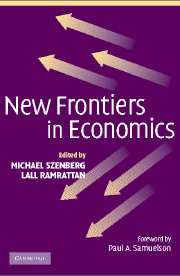Book contents
- Frontmatter
- Contents
- List of Contributors
- Foreword by Paul A. Samuelson
- Preface
- Acknowledgments
- Introduction
- PART I INFORMATIONAL BEHAVIORAL ECONOMICS AND FINANCE
- PART II MACROECONOMICS AND PUBLIC POLICIES
- PART III INTERNATIONAL TRADE AND DEVELOPMENT
- PART IV CONTRACTS, LAW, AND GAMING
- Author Index
- Subject Index
Foreword by Paul A. Samuelson
Published online by Cambridge University Press: 06 July 2010
- Frontmatter
- Contents
- List of Contributors
- Foreword by Paul A. Samuelson
- Preface
- Acknowledgments
- Introduction
- PART I INFORMATIONAL BEHAVIORAL ECONOMICS AND FINANCE
- PART II MACROECONOMICS AND PUBLIC POLICIES
- PART III INTERNATIONAL TRADE AND DEVELOPMENT
- PART IV CONTRACTS, LAW, AND GAMING
- Author Index
- Subject Index
Summary
An evolving discipline – whether it be history or economics or astrophysics or immunology – is ever dynamically changing. Two steps forward and X steps back, so to speak. Periodically, the scholarly group registers more or less self-confidence, self-esteem, and complacency. We careerists are happiest when recent past achievements have seemed to be successful, but when still there are completable tasks dimly visible ahead.
Human nature is much the same in every generation. We each want to leave our distinctive initials on the subject – fulfill our fond teachers' hopes for us but (if possible) do it by bettering their obsolescent achievements. Paradoxically then, it can be just when a science is at a high point in its Kondratieff wave that discontent begins to ferment. It has been said, “Newton did everything, and that set back English mathematics for almost a century while the action moved toward continental writers such as Euler, the Bernoullis, Lagrange, and Laplace.” The bright shine of Keynes in the first half of the last century subsequently shadowed economics at Oxbridge. And because Nature abhors a vacuum, that gave my generation of American economists – American-cum-Hitlerian refugees – the opportunity to peddle at the vanguard of the bicycle race. Today's textbooks at every stage – beginning, intermediate, and advanced – are notably similar. Once upon a time, you could have learned a different economics at Madison and Austin and Berkeley than at Cambridge or Chicago. Now there is no hole to hide in.
- Type
- Chapter
- Information
- New Frontiers in Economics , pp. xi - xiiPublisher: Cambridge University PressPrint publication year: 2004
- 1
- Cited by



